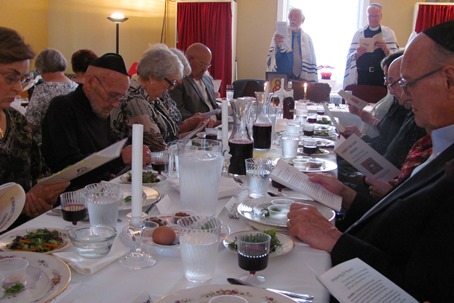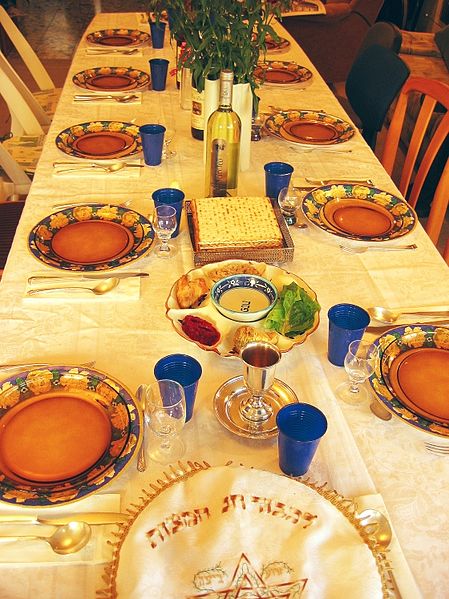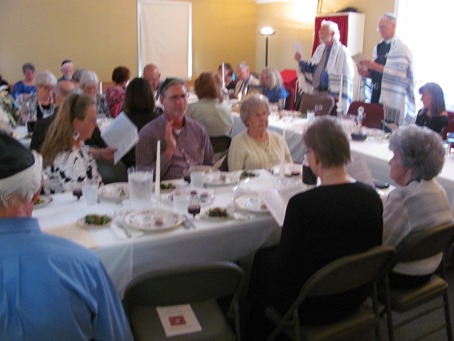The Christian Seder Meal as Sacrament and Precursor to the Fulfillment of Romans 11

Several weeks ago I posted a Facebook notice with pictures enthusiastically describing a Christian Passover I participated in at the church of Christ the King (Anglican) in Hiawassee, GA. The service was marked by observing the Jewish Passover rituals and prayers, but with Christian interpretations added. Some of the men of the parish, including the rector, Fr. Don O’Malley, wore Jewish prayer shawls and skull caps. It was all beautifully done, and many participants experienced it as an especially grace-filled and joyful evening. The pictures below demonstrate this.
To my surprise I received numerous negative comments. Some saying that Jews are offended by these “mixed” Jewish-Christian Passovers. That is hard to understand, as imitation is the sincerest form of flattery. Several clergy from Orthodox and liturgical denominations strongly insisted that Jewish traditions and observances have no part in a Christian church. They seemed to take special offense at my claim that Passover was an Old Testament sacrament and could be observed by Christians to receive its grace.

Image: Gilabrand / Wikimedia Commons
I argued for the continuity of the Old Testament feasts as sacraments (that is, covenant rituals that are the occasion of God’s grace) in my previous work, Forgotten Power: The Significance of the Lord’s Supper in Revival.[1] Let me recap that argument. It contradicts the consensus of Medieval Western (and Eastern) theology which strongly affirms that sacraments were restricted to the New Testament period. For instance, the classic Catholic catechism definition of a sacrament is “An outward sign, instituted by Christ to give grace.” Protestant definitions are similar, although often do not specifically mention Christ. It is important to note that the Catholic definition was late in formulating and there was much discussion on the issue in the early Middle Ages. For instance, St. Bernard of Clairvaux argued that marriage was instituted directly by God and a valid source of grace even among non-Christians. However, St. Thomas Aquinas and his Christ-only view of the origins of the sacraments eventually won out and became official doctrine. Thomas’ view, of course, excluded the possibility that the God ordained rituals and festivals of the Old Testament were in any way sacramental and grace giving. His position passed on to Protestant sacramental theology where the mandated festivals such as Passover are termed “ordinances.”[2]
John’s Baptism as Jewish sacrament
What was missing in this consensus theology was an appreciation of what Paul said in Romans 11, that Jews are still a living root to Christianity. But before we get to that let me point out a critically important New Testament scripture that affirms St. Bernard and contradicts St. Thomas. It is found in Luke 7, where the writer (Luke) describes the spiritual effects of the ministry of John the Baptist:
All the people, even the tax collectors, when they heard Jesus’ words, acknowledged that God’s way was right, because they had been baptized by John. But the Pharisees and the experts in the law rejected God’s purpose for themselves, because they had not been baptized by John (vs 29-30).
 Now, clearly John the Baptist is ministering as a Jew in the Old Testament era. He is identified by Jesus as such with the promise that Believers in Him will be even greater than the greatest Old Testament figures (Matt 11:11). From Acts we learn that John’s baptism was effective for repentance and the forgiveness of sins (Acts 19:2-4). In any case, in the two verses above it is clear that those who receive John’s baptism had received a special grace for accepting God’s purposes. That is, an outward sign that gave a grace, i.e. a sacrament.
Now, clearly John the Baptist is ministering as a Jew in the Old Testament era. He is identified by Jesus as such with the promise that Believers in Him will be even greater than the greatest Old Testament figures (Matt 11:11). From Acts we learn that John’s baptism was effective for repentance and the forgiveness of sins (Acts 19:2-4). In any case, in the two verses above it is clear that those who receive John’s baptism had received a special grace for accepting God’s purposes. That is, an outward sign that gave a grace, i.e. a sacrament.
Category: Ministry, Summer 2016


